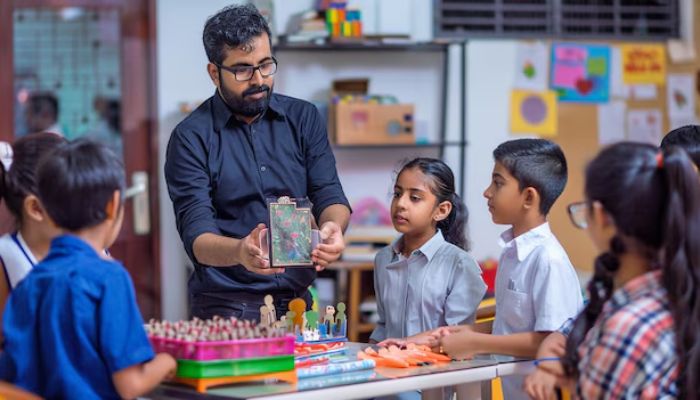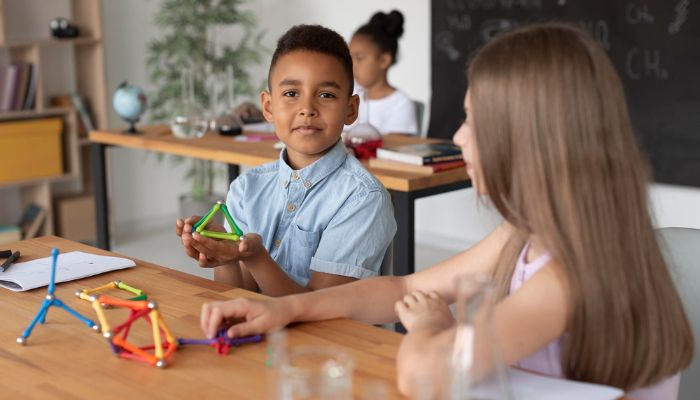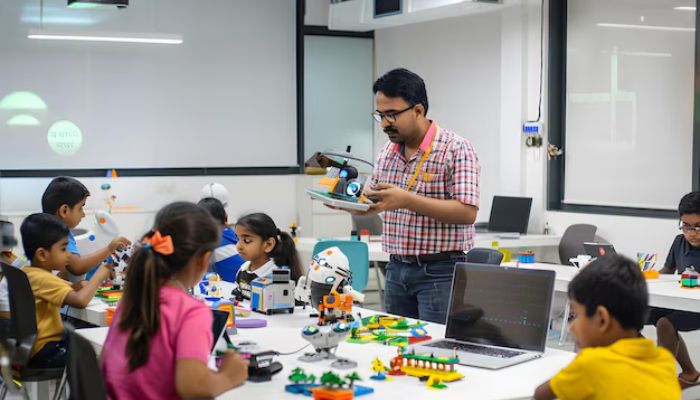For many years, especially in conventional schools, education was frequently viewed as a solemn, desk-bound, and serious endeavor. But what if a box of building blocks, rather than a thicker textbook, held the key to more profound and efficient learning? Welcome to the world of play-based learning, a natural yet revolutionary approach that is redefining the contemporary educational system and demonstrating that play is essential, not just enjoyable.
What is Play-Based Learning?

In a nutshell, play-based learning is an educational strategy in which kids learn via self-directed, freely chosen play. Creating an environment full of opportunities that let kids explore, learn, and solve problems at their own pace is more important than letting them play unstructured all the time.
The main concept is to use a child’s innate curiosity and love of play as a means of teaching them academic material and critical life skills. Instead of interfering with play, a good teacher helps it along by gently guiding the child’s discoveries and connecting them to particular learning objectives. Children participate in deep experiential learning whether they are constructing a city out of blocks, acting out the operation of a grocery store, or blending colors with paint.
The Immense Benefits of Play-Based Learning

This method has become a mainstay of high-quality early childhood education because of its extensive benefits, which cover all facets of a child’s development.
1. Cognitive and Critical Thinking Skills
Children’s brains are very active when they play. Complex problem-solving tasks include constructing a tall tower (and determining why it keeps toppling over) and navigating the rules of a pretend game.
- Solving problems – Play inherently poses difficulties. A child is actively learning math and spatial reasoning when they attempt to fit puzzle pieces together or divide playdough evenly among friends.
- Creativity and Imagination – Pretend play and role-playing are effective strategies for enhancing imagination. They acquire creative and abstract thinking abilities, which are essential for later-life innovation.
- Language and Literacy – Children practice storytelling, employ new vocabulary, and enhance their communication abilities through dramatic play. By placing a notepad in the “doctor’s office,” a teacher can promote “writing” prescriptions and make a clear connection between play and literacy.
2. Social and Emotional Development
Play-based learning really excels in this situation. Play necessitates continuous interaction, compromise, and self-control, in contrast to listening while seated at a desk.
- Cooperation and Empathy – Sharing toys, waiting for a turn, and being sensitive to their playmates’ emotions are all part of group play. They develop empathy by learning to view things from another person’s point of view.
- Resolution of Conflicts – Play naturally involves disagreements. Negotiation and conflict resolution skills are essential when figuring out who gets to be the “captain” or how to mend a broken structure.
- Self-Regulation – When kids wait for their turn or deal with the disappointment of a game not going their way, they are practicing emotional control.
3. Physical Development
Play is crucial for the development of both fine and gross motor skills, particularly outdoor and active play.
- Gross Motor Skills – Play activities that involve running, climbing, and jumping help children develop their strength, balance, and coordination. For young children attending residential schools in Dehradun or any other location with large grounds, this is especially crucial.
- Fine Motor Skills – Hand muscles are strengthened through activities like molding clay, threading beads, drawing, and building with small blocks. This helps the hands become ready for writing and other intricate tasks.
Play-Based Learning and the Modern Education System

The modern educational system recognizes that future success depends more on abilities like flexibility, critical thinking, and teamwork, skills that play-based learning cultivates, than it does on memorization of facts.
The Shift to Experiential Learning
Experiential learning, or more precisely, “learning by doing,” is exemplified by play-based learning. This represents a significant departure from the conventional lecture-based teaching approach.
The student is an active participant rather than a passive recipient in an experiential learning setting. They participate in field trips, debate, and basic science experiments. The experience is followed by analysis and reflection, which solidifies the knowledge gained. This method makes learning incredibly meaningful and lasting by preparing students for real-world situations.
Integrating Play in Primary and Beyond
Although play-based learning is most prevalent in early childhood education, its concepts are carried over to higher grades through group challenges, project-based learning, and simulations. A history class putting on a mock trial or a high school physics class creating a working model are just more complex examples of supervised, practical, experiential learning.
Choosing the Right Educational Environment
The choice of school is crucial for parents looking for a setting that genuinely embraces this all-encompassing and progressive approach. Play-based learning and experiential learning are replacing rote learning in many of the best schools in India, including elite establishments.
With its exceptional concentration of high-quality institutions, places like Dehradun have developed into a center for educational institutions dedicated to contemporary pedagogy. Parents looking for the best residential schools in India or Dehradun should seek out establishments that –
1. Make Play a Priority – During the foundational years, play-based learning should be specifically mentioned in the curriculum.
2. Provide Rich Environments – A good residential school in Dehradun will have a lot of outdoor play space, well-equipped learning centers, and a safe, natural setting.
3. Use Guided Facilitation – Employ guided facilitation, which involves teachers observing play and subtly introducing deeper learning resources or questions without interfering with the play itself.
4. Adopt Experiential Learning – Projects, outdoor education, and practical exercises that reinforce the “learning by doing” concept should be incorporated into the curriculum for older kids.
Children have always known that learning is most effective when it is enjoyable, and the education community has finally recognized this. Play-Based Learning is a powerful, scientifically supported approach that guarantees children acquire the critical social, emotional, physical, and cognitive skills required to succeed in the twenty-first century. It is not a passing fad.
Whether in a friendly day school or a special residential school in Dehradun, we are giving kids the best start possible by emphasizing play. In order to ensure that our children develop into self-assured, imaginative, and competent adults, the happy revolution is redefining early childhood education and spearheading the modern education system. The most significant and serious task of childhood is, in fact, the simple act of play.
Also read: CBSE Introduces Open-Book Assessments for Class 9 in 2026–27 Academic Year














